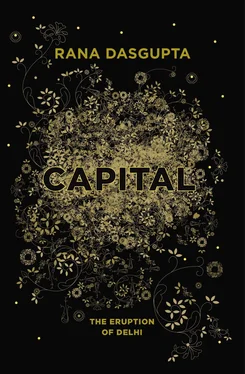“Moving that kind of cash is a big physical operation. It’s stored in warehouses and to move it you need a truck. When one of those trucks starts moving through Delhi, everyone knows about it. The police take a cut of the money and they guard it all along the route. They give the truck driver a code, which he can give to any policeman and they will let him pass. Delhi isn’t safe because there are always opposition politicians who are trying to expose this money. Mumbai is much safer. I’m not going to do this again. But this is one of those times when I can earn a lot of money in one go, and I have to try it.
“All the politicians are bringing their black money back now. There is a huge conversion of black to white. This is going to be beautiful for India because it will all be invested here and will change everything. In the next ten years, India is going to fuck everywhere. Until now we’ve been funding Swiss citizens’ old age with our money. Now it’s going to come home. Billions of dollars will flow into the country and we will reap the benefit of our corrupt politicians. You can say it’s God’s will. God is recycling this money. People talk about China, but China can never beat India because our politicians have been corrupt for years and years. Their money is building an empire that will rule the world.
“The black money business isn’t my only one. I have another business too: I’m working for a company owned by someone in the Gandhi family, who offers big loans to companies so he can bring back the money he has parked in Swiss accounts. Right now I’m working on a loan to a Gujarati businessman. Very big guy. He needs 15 lakh crores to expand his business and I’m trying to organise it for him.”
He rifles in his bag and pulls out a folder filled with letters between him and a business conglomerate in Gujarat. He hands them to me for my inspection.
“I’m meeting them soon to get the papers signed.”
I like Anurag but he is unpolished and incoherent, and I find it difficult to imagine him being admitted to the inner circle of Indian deal-making. The letters look official but I have no idea what to make of them.
“Are you sure you mean 15 lakh crores?” I ask.
“Look at these people,” he says, showing me letterheads listing business subsidiaries. Mining, infrastructure, mass media, airlines, insurance, agriculture. “See how big they are.”
“And you’re saying the Gandhis are lending this money?”
“Obviously.”
I am trying to work out in my head how much this sum is. Anurag takes out his phone but there is no space on it to type that many zeroes. We finally compute it together: $300 billion.
“Don’t be ridiculous, Anurag.”
He steps back a little from his position.
“It’s not all in one go. It’s over many years. It’s for many different projects. Power, agriculture.”
“$300 billion. Come on!”
“It’s the Gandhis! You can’t imagine how big they are. Just think: any chief minister of Uttar Pradesh will end their five-year term with 50,000 crores [$10 billion] in their pocket. And now think what the Congress must have. This is the Congress man! They have been ruling since 1947! Do you know how much Indian business belongs to them? You just don’t get it. For them this kind of money is nothing.”
“The GDP of India is only five times that.”
“Black money is much more than the GDP! This is what I was telling you. Politicians are bringing their money back into India. They want to invest in India and they need good partners. Giving big loans to companies who are building the nation and who pay 24 per cent a year for black money is the best way.”
At that moment, someone calls him. He has a conversation about providing a loan for several hundred million dollars. Anurag talks confidently about how he will bring in one of India’s leading real-estate companies to finance part of this loan. His commission will be 1.5 per cent.
It feels like a planted call. I feel I am in a fictional world of his making.
Anurag’s call ends. He says,
“This is how it works. The biggest businessmen don’t go to banks for funding. This Gujarati company has a lot of projects, they need 15 lakh crores, and they know the only place they can get it is from the Congress Party. They went to Ambani [Mukesh Ambani, India’s richest businessman], but Ambani can’t give that kind of money. So they came to us.
“The Congress has so much money they have to invest it. And it’s excellent for the country. They are growing India now. And soon I’ll make money for myself and I can do something for the country too. If I make 1 per cent or 2 per cent on any of my deals, I can really start out. I need 1,000 crores [$200 million] for myself, and if my deals start happening it won’t be difficult. I have a friend who made 320 crores [$64 million] on a black money deal recently. He bought himself a Bugatti. I wouldn’t do that. I would do up my house really nice. But I need money for other things.”
In Anurag’s stories, the membrane separating reality and fantasy is exquisitely permeable. One never knows how to tell the two apart. It is not clear that he does, either. In fact what I find interesting about him is that he finds society so extreme that there is almost nothing that cannot plausibly be asserted. His Delhi is a bewildering place, full of vast monsters whose species and scale are indiscernible in the spiritual night, and I understand why he is so lost. And why finding himself again can be imagined only in one way: earning loads of money.
“I want to make things better. If only I had 5 crores [$1 million] I would just have a good life and drive a BMW. But then I’d just be living for myself. I wouldn’t be able to do anything for my nation. I want to change things. I want to show people how to live. That’s why I need 1,000 crores.
“Delhi is a good place but the people are bastards. They’re big show-offs. They don’t know about life. They have dirty minds and they only think about money. I want to make them feel. Money has killed their feelings. God did not do this. We did it and we can change. If I have the money I will change people’s souls.”
Delhi is obsessed with money, it is the only language it understands, and to buy myself out of its vulgarity and its money-mindedness, I need lots of money. It is a strange, self-defeating logic which obviously universalises the escalation of that which it hates.
“There was a wedding party in the street where I live, and they put up a marquee outside my house. There was a tree in the way and they cut it down just to put up their marquee. They cut down a tree that took forty years to grow just for one party. They don’t understand anything. I went to ask them, ‘ Why are you fucking this tree? ’ But they don’t care what I think. I can’t fight with them right now. That’s why I need money. I want to be strong and when I find people like that, I want to fuck their happiness. You can say there’s a fire in me right now.”
It’s true, it seems, since Anurag, sitting in his shirt, is apparently unaffected by the cold of this February night, while I, wrapped up in a coat, am shivering violently.
The watchman comes back to ask for a drink. Anurag pours him some rum.
“Where have all the good dogs gone?” he asks him.
The watchman spreads his hands in ignorance.
“That black-and-white one was a brilliant dog,” Anurag says.
The watchman walks off into the blackness of the park.
“Animals are so pure,” says Anurag, “so true to their nature. They don’t change. You have no idea how much I love animals. I used to bring food for that black-and-white dog all the time. If I woke up in the night and it was raining I used to drive over here and put up tarpaulin sheets between the trees so he could keep dry. I used to bring a coat for him in the winter.
Читать дальше











